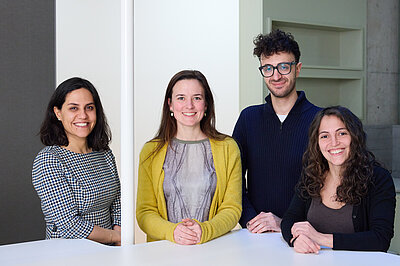Linking postdocs: Fostering collaboration and decision making
Through new initiatives like the Postdoc Networking Day (PoND), postdoc representatives Federico Teloni, Laura Kracht, Shamsi Emtenani and Flavia Corsi spearheaded initiatives to strengthen campus community bonds and support systems. They told us about their experience at IMBA, their work as representatives and what drives them to contribute.
Laura Kracht: I like to do research at IMBA because of the extraordinary facilities and infrastructure. We have access to multiple state-of-the-art techniques and equipment, as well as experienced staff who operate those systems and support us with data analysis. This takes a significant burden off the researchers and gives us freedom to answer our scientific questions with the best-fitting techniques available.
Shamsi Emtenani: I find great value in the supportive network at IMBA, where colleagues readily share knowledge and resources, fostering a collaborative spirit that propels our research forward with ingenuity and efficiency.
Laura Kracht: I value connecting with other people in similar roles, and knowing how other people think or feel about shared topics. Also, I was keen to understand the structure of the institute a bit better.
Shamsi Emtenani: I was eager to improve how I communicate with other, non-scientific staff of the institute. I also think it’s crucial to amplify the voices of postdocs and increase their visibility. Lastly, seeing the institute structure from the other side was also important to me.
Federico Teloni: I wanted to gain a clearer understanding of the decision-making process at the institutional level, as this may not always be evident to postdocs. I also wanted to help the institute to develop an administrative framework that best supports the various needs of our postdoc community.
Federico Teloni: We are trying to connect Postdocs all around the Vienna BioCenter through events like the Postdoc Networking Day (PoND), where they can all get together, share their research and network.
Flavia Corsi: Working at an academic institute can be very rewarding, but it can also create stress. We have collaborated in mental health awareness initiatives. Also, we want to make it easier for researchers from non-European countries to immigrate to Austria.
Shamsi Emtenani: As scientists, we’re used to dealing with scientific problems, but we have learned that some problems are moral, political or artistic, and should be addressed differently. We’ve improved our communication with other members of our institute and are involved in transparent decision-making.
Federico Teloni: As a representative, I gained insights into the rationale behind certain decisions. We’ve been able to share that with our colleagues, improving communication within the institute. It has also helped our colleagues realize that our scientific interests and reasoning must be balanced with the administrative capabilities and requirements of the institute.
Flavia Corsi: We realized that leadership skills are not commonly part of academic training. The Vienna BioCenter has taken proactive steps by offering leadership courses, and we are optimistic that these initiatives will continue to strengthen cohesiveness at the institutes.
